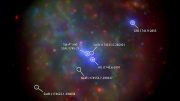
New research indicates that freshwater existed on Earth four billion years ago, 500 million years earlier than previously thought, reshaping our understanding of the planet’s early conditions and the emergence of life.
Recent research led by Curtin University has discovered that freshwater appeared on Earth four billion years ago, suggesting that conditions for life developed significantly earlier than previously thought.
New research led by Curtin University has uncovered evidence suggesting that fresh water, crucial for life, emerged on Earth around four billion years ago—500 million years earlier than previously believed.
Lead author Dr. Hamed Gamaleldien, Adjunct Research Fellow in Curtin’s School of Earth and Planetary Sciences and an Assistant Professor at Khalifa University, UAE, said by analyzing ancient crystals from the Jack Hills in Western Australia’s Mid West region, researchers have pushed back the timeline for the emergence of fresh water to just a few hundred million years after the planet’s formation.
Findings on Water’s Origins
“We were able to date the origins of the hydrological cycle, which is the continuous process through which water moves around Earth and is crucial for sustaining ecosystems and supporting life on our planet,” Dr Gamaleldien said.
“By examining the age and oxygen isotopes in tiny crystals of the mineral zircon, we found unusually light isotopic signatures as far back as four billion years ago. Such light oxygen isotopes are typically the result of hot, fresh water-altering rocks several kilometers below Earth’s surface.
“Evidence of freshwater this deep inside Earth challenges the existing theory that Earth was completely covered by ocean four billion years ago.”

Curtin University’s Dr. Hugo Olierook with a rock from the Jack Hills in Western Australia, which contained the zircon crystals analyzed in this research. Credit: Curtin University
Study co-author Dr Hugo Olierook, from Curtin University’s School of Earth and Planetary Sciences, said the discovery was crucial for understanding how Earth formed and how life emerged.
“This discovery not only sheds light on Earth’s early history but also suggests landmasses and freshwater set the stage for life to flourish within a relatively short time frame – less than 600 million years after the planet formed,” Dr Olierook said.
“The findings mark a significant step forward in our understanding of Earth’s early history and open doors for further exploration into the origins of life.”
Reference: “Onset of the Earth’s hydrological cycle four billion years ago or earlier” by Hamed Gamaleldien, Li-Guang Wu, Hugo K. H. Olierook, Christopher L. Kirkland, Uwe Kirscher, Zheng-Xiang Li, Tim E. Johnson, Sean Makin, Qiu-Li Li, Qiang Jiang, Simon A. Wilde and Xian-Hua Li, 3 June 2024, Nature Geoscience.
DOI: 10.1038/s41561-024-01450-0
The authors are part of the Earth Dynamics Research Group and the Timescales of Mineral Systems Group, which sit within Curtin’s School of Earth and Planetary Sciences, and the John de Laeter Centre.
Part of the research was done using the CAMECA 1300HR3 instrument in the John de Laeter Centre’s Large Geometry Ion Microprobe (LGIM) facility, which was funded by AuScope (via the Commonwealth National Collaborative Research Infrastructure Strategy), the Geological Survey of Western Australia and Curtin University.









Well, thanks to the JWST we now know that EVERYTHING is quite a bit older than previously thought.
If the Earth was indeed covered by a water ocean 4 billion years ago, 600 million years after the Earth had formed, how is it that new evidence from zircon crystals indicate that only 600 million years ago after the Earth had formed did fresh water form. Something a bit odd there.
It would seem to confirm previous supposition that the Earth could have been covered by a water ocean at 4 billion years BP which would have provided an environment conducive for life, rather than anything else.